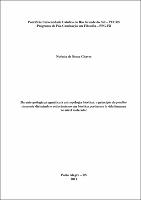| Compartilhe o registro |


|
Use este identificador para citar ou linkar para este item:
https://tede2.pucrs.br/tede2/handle/tede/2881| Tipo do documento: | Tese |
| Título: | Da antropologia pragmática à antropologia bioética: o princípio da prudência-ponte dirimindo o reducionismo em bioética pertinente à vida humana no nível molecular |
| Autor: | Chaves, Noêmia de Sousa  |
| Primeiro orientador: | Bavaresco, Agemir |
| Resumo: | Essa tese tem como objetivo demonstrar que existe um reducionismo em bioética e que este se manifesta a partir de três formas: a) topológico; b) proximidade; e c) laicização da vida. Tais formas de reducionismos impedem a definição de um status moral e também de um trato prudencial com os materiais genéticos e os embriões humanos. Com isso, constata-se o acelerado avanço biotecnológico e a sua intrínseca relação com o mundo da política, da economia e da ciência, que tem gerado uma nova forma de atividade comercial, a saber, da vida humana no nível molecular. Tal situação suscita novos questionamentos. Entre eles, pode-se destacar o seguinte: os materiais genéticos humanos possuem valor ou preço? Tendo em vista a solução dessa questão, considera-se que o resgate do imperativo hipotético da prudência, de matriz kantiana, pode se constituir no fundamento de uma antropologia bioética e, a partir disso, balizar as relações assimétricas entre os pesquisadores, de um lado, e os materiais genéticos e os embriões humanos, de outro lado. Para tal, o princípio da prudência deve ser compreendido como prudência-ponte e ter, nesse sentido, realçado o seu caráter reflexivo e preditivo. Para realizar-se o trabalho, apresentaremos, no primeiro momento, os significados da prudência na arquitetônica kantiana, pontuando a aproximação das questões de bioética com o cosmopolitismo. Nosso objeto tratará da definição do lugar e do papel da prudência no sistema kantiano, demonstrando a sua característica de imperativo hipotético fraco, localizado entre a destreza e a moral, e, por isso, constituindo-se no princípio da prudência-ponte. Feito isso, recorreremos a esse princípio para evidenciar e dirimir o reducionismo em bioética. Nesse segundo momento, teceremos um debate com autores da bioética, apontando para a fragilidade da fundamentação de seus argumentos erigidos a partir das obras morais de Kant, quer seja a favor da manipulação embrionária, quer seja contra tal procedimento. E, por fim, a prudência- ponte será justificada como a condição necessária para se fundamentar uma antropologia bioética, que tem na vida humana molecular o seu objeto adstrito, e não meramente eletivo. |
| Abstract: | This thesis aims to demonstrate that there is a reductionism in bioethics and this comes out as one of three ways: a) topological; b) proximity; and c) life secularization. These three forms of reductionism hinder a definition of a moral status and also a prudential deal of the genetic materials and human embryos. Thus, there is a quickly advance of biotechnology and its intrinsic relationship to the world of politics, economy and science which has generated a new form of commercial activity, namely, the human life at the molecular level. This raises new questions. Among them, one can highlight the following: does the human genetic material have a prize or value? Aiming at the solution of this question, one considers the rescue of the hypothetic imperative of prudence, of Kantian matrix, can constitute the foundation of bioethics anthropology, and, from this point, could equalize the relationship asymmetric between researches, at one side, and genetic materials and human embryos, on the other side. To this end, the prudence principle should be understood as prudence-bridge and have, accordantly, emphasized its reflexive and predictive character. At first, we will present the meaning of prudence in Kantian architectonic, pointing the proximity between bioethics issues and cosmopolitanism. Our object will address the definition of the place and role of prudence in Kantian system, showing its characteristic weak hypothetical imperative located between dexterity (skill) and moral, and therefore, consisting on the prudence-bridge principle. After that, we will use this principle in order to evidence and settle the reductionism in bioethics. At this second moment, we will weave a debate among authors of bioethics, pointing to the fragile foundation of their arguments reared from Kant s moral works, whether in favor of embryo manipulation or against it. Finally, prudence-bridge will be justified as the necessary condition to support an bioethics anthropology, which has molecular human live attached to its object and not merely elective. |
| Palavras-chave: | FILOSOFIA ANTROPOLOGIA BIOÉTICA KANT, IMMANUEL - CRÍTICA E INTERPRETAÇÃO REDUCIONISMO PRUDÊNCIA (FILOSOFIA) ANTROPOLOGIA FILOSÓFICA |
| Área(s) do CNPq: | CNPQ::CIENCIAS HUMANAS::FILOSOFIA |
| Idioma: | por |
| País: | BR |
| Instituição: | Pontifícia Universidade Católica do Rio Grande do Sul |
| Sigla da instituição: | PUCRS |
| Departamento: | Faculdade de Filosofia e Ciências Humanas |
| Programa: | Programa de Pós-Graduação em Filosofia |
| Citação: | CHAVES, Noêmia de Sousa. Da antropologia pragmática à antropologia bioética: o princípio da prudência-ponte dirimindo o reducionismo em bioética pertinente à vida humana no nível molecular. 2011. 137 f. Tese (Doutorado em Filosofia) - Pontifícia Universidade Católica do Rio Grande do Sul, Porto Alegre, 2011. |
| Tipo de acesso: | Acesso Aberto |
| URI: | http://tede2.pucrs.br/tede2/handle/tede/2881 |
| Data de defesa: | 9-Dez-2011 |
| Aparece nas coleções: | Programa de Pós-Graduação em Filosofia |
Arquivos associados a este item:
| Arquivo | Descrição | Tamanho | Formato | |
|---|---|---|---|---|
| 435427.pdf | Texto Completo | 576,21 kB | Adobe PDF |  Baixar/Abrir Pré-Visualizar |
Os itens no repositório estão protegidos por copyright, com todos os direitos reservados, salvo quando é indicado o contrário.




